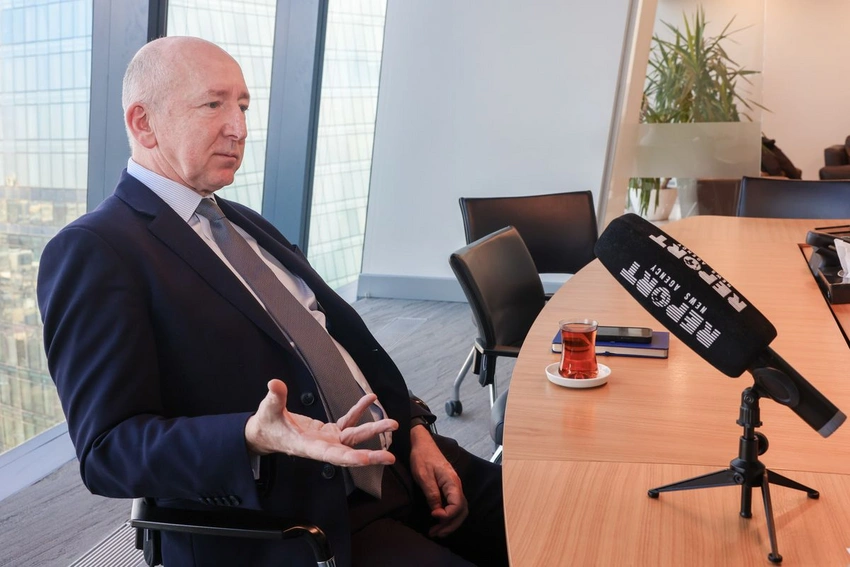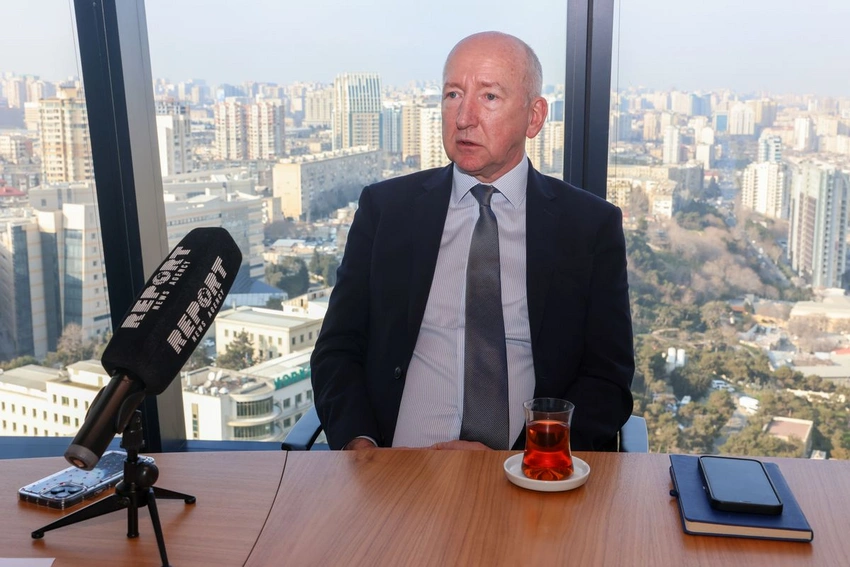John Patterson: COP29 opened up new opportunities for UK businesses in Azerbaijan
- 25 February, 2025
- 11:06

The United Kingdom and Azerbaijan have long maintained robust economic relations, primarily anchored in the oil and gas sector. However, as Azerbaijan's economy diversifies, British companies are increasingly turning their attention to the country's burgeoning non-oil sectors, such as information technology (IT), renewable energy, infrastructure, and finance, for lucrative investment opportunities.
The British Chamber of Commerce in Azerbaijan has been instrumental in fostering stronger business ties between the two nations and attracting investments.
In an interview with Report, Chamber Chairman John Patterson shed light on the organization's work, the prospects for bilateral trade, British businesses' growing interest in Azerbaijan's non-oil sectors, the emerging opportunities for investors in the country and other relevant topics.
- How do you assess the current state of economic relations between Azerbaijan and the United Kingdom, and which key sectors are the main drivers of bilateral trade and investment?
- Oil and gas sector remains the key driver of bilateral trade and investment. BP, one of the largest investors in Azerbaijan, and other British companies have already made significant contributions to the development of this industry in Azerbaijan. However, their potential for contributing to the country's economy is still far from being fully realized.

The participation of UK Prime Minister Keir Starmer and a delegation of high-ranking British government officials in the COP29 climate conference in Baku underscores the value of bilateral relations between Azerbaijan and the United Kingdom. It also reflects UK's desire to expand trade ties with Azerbaijan and attract more British companies to the country.
In today's world, there is a trend towards reducing fossil fuel use, which stimulates the development of the non-oil sector and increases interest in it. This, in turn, strengthens the desire to diversify foreign trade beyond solely the oil and gas industry.
The United Kingdom holds strong positions in various fields, which opens new prospects for mutually beneficial cooperation. For instance, London, one of the world's leading educational centers, is only five-hour flight from Baku, the fact that makes cooperation in education even more accessible and effective.
Speaking about key factors contributing to the expansion of bilateral trade and investment, we see great prospects in the construction sector. British architects, know for their projects worldwide, could share valuable knowledge with their Azerbaijani colleagues.
The UK also has significant experience in cybersecurity and business training, especially in programming using artificial intelligence. We are currently actively developing the IT sector, particularly in cybersecurity and artificial intelligence development.
Furthermore, our countries have enormous potential for cooperation in areas such as agriculture, healthcare, and others.

- Could you provide some statistics? How many British companies operate in Azerbaijan, both in oil and non-oil sectors?
- The British Chamber of Commerce in Azerbaijan currently has about 110 members. There are British companies that are not members of the chamber, and conversely, some do business with the United Kingdom but are not British. The number of companies already operating in the country and firms wishing to do business here is probably around 400. This includes companies registered as British, which employ a large number of Azerbaijanis.
The majority of our companies are represented in the oil and gas sector, since we are traditionally oriented towards this industry. However, we are actively seeking to increase the number of companies in the non-oil sector, since, as I mentioned, there is significant growth and development here. I think the growing interest in non-oil sectors is largely due to the development of renewable energy sources and the positive outcomes of COP29.
You may argue that climate change isn't man-made, that it's a natural phenomenon, you can do whatever you like. But just look at the air quality in Beijing.
With the transition to electric cars that do not emit traditional exhausts, the difference is unbeliveable. The air has improved dramatically, a clear demonstration of the impact of environmentally clean technologies.
- As sustainability and innovation become priorities in international business, how does the Chamber support British companies in Azerbaijan in addressing these challenges?
- Good question. In most British companies, innovation and business sustainability issues are taken care by the head office that implements these innovative and sustainable ideas: the company develops new approaches and technologies and then adapts them for implementation in other countries, including Azerbaijan.
We, in turn, are ready to provide support in training certain skills. For instance, Imperial College London and Cambridge University plans to launch courses on "green" knowledge, which is part of the sustainability idea. These courses can be offered both online and in-person, and can be taken by both individual participants and companies deciding to train their employees. Imperial College London will provide this service as part of their business offering.
This initiative makes it possible to support not only the British community but also the international community operating in Azerbaijan and local companies, providing them with the opportunity to get the latest knowledge about global trends and understand what the future is going to be and what they need to do legislatively.
- What can you say about business missions between our countries?
- There is a joint intergovernmental commission that meets every year. This year it will meet in the United Kingdom. We would very much like to have a meeting of business representatives as part of this session, as we want to introduce Azerbaijani business to British business. London is known as one of the world's financial centers, perhaps even leading in some areas.
Perhaps we can invite companies there to take advantage of Azerbaijan's COP29 presidency.
There are good relations between our governments, but we need to improve relations between businesses as well.
Events such as Innovation Zero and London Climate Action Week can be used to promote Azerbaijan as a business destination and to take advantage of innovations available in the UK to bring them here. Perhaps take advantage of our knowledge on risk reduction and decarbonization.
Why not? So, the finance sector is something we might really want to focus on, but business-to-business interaction is something we'd like to do the most,

- The UK government recently appointed John Alderdice as the new Trade Envoy to Azerbaijan and Central Asia. Is he expected to visit Baku any time soon?
- I think, yes. Since he's from the new government, there will be a lot of new protocols. But he will certainly be present at the joint intergovernmental commission meeting.
So, I'm sure he'll be there, I think he'll practically be leading the event. The exact date of the intergovernmental commission hasn't been determined yet. It's being discussed at the government level. However, I can say that it might take place in the first half of this year, spring-summer.
- What actions does the chamber take to strengthen support for British business in Azerbaijan and attract new companies from your country?
- First of all, British companies know we [the Chamber of Commerce] are here. By the way, this is one of the important outcomes of COP29 - now businesses understand that if they want to enter the Azerbaijani market, they can always turn to us.
During the climate conference in Baku, one British company already took advantage of this opportunity by signing a memorandum of understanding with the Azerbaijan Investment Company. This agreement was very well received, and now British companies have even more opportunities for cooperation since we have the necessary contacts and resources.
When new companies come to Azerbaijan, we know exactly who to take them to. Azerbaijan is developing, growing more innovative and open to international business. We know the key market players, and they know us, which makes the cooperation process as convenient and efficient as possible. Additionally, the British Embassy has a strong business and trade department team that is also ready to provide significant support.
Besides this, we have access to other organizations in the UK that can share their experience or offer products and services that are in demand in Azerbaijan. So, yes, we are actively working in this direction and are ready to facilitate business partnerships between our countries.

- Does the chamber cooperate with local Azerbaijani companies to expand their activities in the British market? If yes, which ones?
- We maintain strong relations with the Embassy of Azerbaijan in London. Azerbaijan's Ambassador to the UK, Elin Suleymanov, is always helpful and ready to support our initiatives.
Currently, we are considering expanding the Chamber's activities to help even more Azerbaijani companies interested in exporting. Recently, we were approached with a request to explore the possibility of reducing import tariffs on certain goods produced in Azerbaijan. This issue can be brought up for discussion at the intergovernmental commission.
For instance, if the Azerbaijani government wants to expand exports of cotton or textile products to the UK, it can propose the British side to consider ways to remove trade barriers.
Many Azerbaijani companies are looking to enter the British market, and we are ready to assist them in this. There is an active and successful Azerbaijani diaspora in the UK, and strengthening ties with it can also contribute to business cooperation development. The chamber also tries to support local companies in Baku.
For instance, we have developed good relations with Flame Towers. This is an iconic location in Baku, and we are ready to provide support in matters of rental or use of premises if needed.
